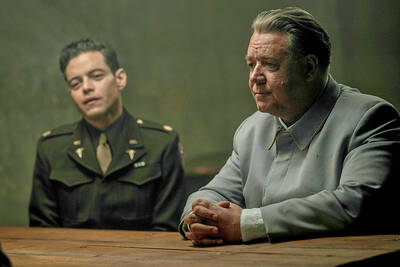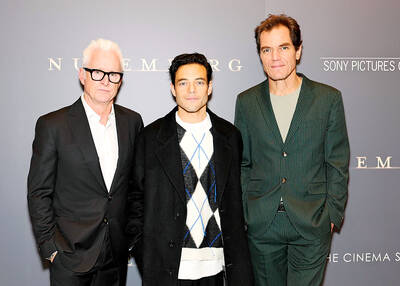For a director like Ann Hui (許鞍華), who excels when dealing with everyday reality, it is understandable that age becomes a recurring theme. Among the Hong Kong doyenne’s wide-ranging oeuvre in the past 30 years, middle-aged experiences have been studied in Summer Snow (女人四 十, 1995) and July Rhapsody (男人四 十, 2002), while, to a lesser extent, the subject of getting old is addressed in The Postmodern Life of My Aunt (姨媽的後現代生活, 2006).
With A Simple Life (桃姐), Hui’s newest film, the 65-year-old director looks old age directly in the eye and tells a bittersweet, heartwarming story about a relationship between a man and his servant. The film sees Andy Lau (劉德華) and Deanie Ip (葉德嫻) reunited on the big screen for the first time in 23 years; the latter won top honors at the Venice International Film Festival and the Golden Horse Awards (金馬獎) last year for her role in the film.
The 64-year-old Ip plays Ah Tao, a domestic helper who has worked as maid and nanny for several generations of the Leung family since her teens. Over the 60 years that Ah Tao dedicated to serving the household, elders passed away, children were born and grew up, and most members of the family emigrated. She now takes care of Roger (Lau), a bachelor film producer and the last family member to remain in Hong Kong.
One day, Ah Tao falls ill when preparing supper. In the evening, Roger returns from a trip to Beijing and finds the aging servant unconscious after a stroke.
Believing she has become a burden, Ah Tao asks Roger to put her into a nursing home. Worn and crowded, the new environment seems depressing to Ah Tao at first, but she gradually adjusts and makes friends with the other residents.
But life without Ah Tao makes Roger begin to realize just how important she is to him and he decides to look after the woman who has nursed him all his life. The two grow closer to each other, and their mutual affection brings solace and contentment to their lives. As Ah Tao’s health deteriorates, Roger prepares for the final farewell.
Drawn from the life story of Hong Kong film producer Roger Lee (李恩霖), who co-wrote the script with Susan Chan (陳淑賢), and his family’s servant Chung Chun-tao (鍾春桃), the film is an eloquent manifestation of Hui’s aptitude for telling heartfelt tales of everyday life. The veteran director takes a slice-of-life approach to her subjects and confidently lets the narration slowly progress to reveal the growing bond between a man and his amah, a disappearing breed of domestic helpers who devote lifelong service to a single family.
The narrative weight would not hold, however, without the award-winning performances by Ip and Lau, who have played mother and son on television and in movies numerous times since the 1980s. Having retired from the big screen in 2000, Ip returns with a quiet determination, investing her role with a sensible mixture of dignity and practicality. In an admirably understated manner, megastar Lau plays a man who learns and fulfills his personal and familial responsibilities with subtle changes of emotion. When the two come together, they form dynamics that are always grounded in life and never feel forced.
Though the film deals with old age and death, the overall tone is kept light with vivid characters, like that of veteran actor Paul Chun (秦沛), who plays an aging Don Juan, and the buoyant cameos by a bevy of real-life filmmaking professionals, such as Hong Kong’s Sammo Hung (洪金寶) and Tsui Hark (徐克), as well as director Ning Hao (寧浩) and producer Yu Dong (于冬) from China.
Staying true to the spirit of the story and its protagonists, A Simple Life gracefully avoids the easy route of sentimentality and exudes the warmth and humanity that have come to define the director’s oeuvre. The affecting work looks at the elderly and their caretakers with compassion and restraint and is one of Hui’s best films to date.

The Nuremberg trials have inspired filmmakers before, from Stanley Kramer’s 1961 drama to the 2000 television miniseries with Alec Baldwin and Brian Cox. But for the latest take, Nuremberg, writer-director James Vanderbilt focuses on a lesser-known figure: The US Army psychiatrist Douglas Kelley, who after the war was assigned to supervise and evaluate captured Nazi leaders to ensure they were fit for trial (and also keep them alive). But his is a name that had been largely forgotten: He wasn’t even a character in the miniseries. Kelley, portrayed in the film by Rami Malek, was an ambitious sort who saw in

It’s always a pleasure to see something one has long advocated slowly become reality. The late August visit of a delegation to the Philippines led by Deputy Minister of Agriculture Huang Chao-ching (黃昭欽), Chair of Chinese International Economic Cooperation Association Joseph Lyu (呂桔誠) and US-Taiwan Business Council vice president, Lotta Danielsson, was yet another example of how the two nations are drawing closer together. The security threat from the People’s Republic of China (PRC), along with their complementary economies, is finally fostering growth in ties. Interestingly, officials from both sides often refer to a shared Austronesian heritage when arguing for

Among the Nazis who were prosecuted during the Nuremberg trials in 1945 and 1946 was Hitler’s second-in-command, Hermann Goring. Less widely known, though, is the involvement of the US psychiatrist Douglas Kelley, who spent more than 80 hours interviewing and assessing Goring and 21 other Nazi officials prior to the trials. As described in Jack El-Hai’s 2013 book The Nazi and the Psychiatrist, Kelley was charmed by Goring but also haunted by his own conclusion that the Nazis’ atrocities were not specific to that time and place or to those people: they could in fact happen anywhere. He was ultimately

Last week gave us the droll little comedy of People’s Republic of China’s (PRC) consul general in Osaka posting a threat on X in response to Japanese Prime Minister Sanae Takaichi saying to the Diet that a Chinese attack on Taiwan may be an “existential threat” to Japan. That would allow Japanese Self Defence Forces to respond militarily. The PRC representative then said that if a “filthy neck sticks itself in uninvited, we will cut it off without a moment’s hesitation. Are you prepared for that?” This was widely, and probably deliberately, construed as a threat to behead Takaichi, though it